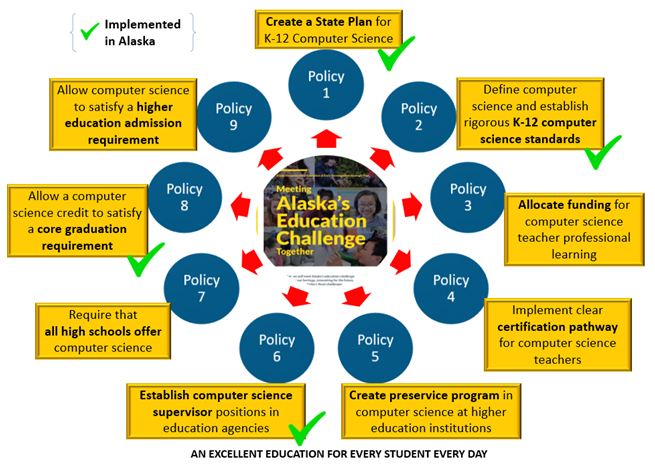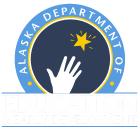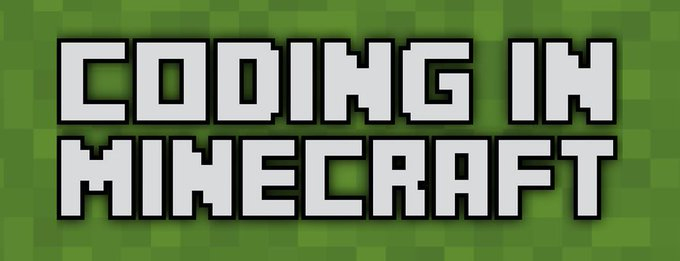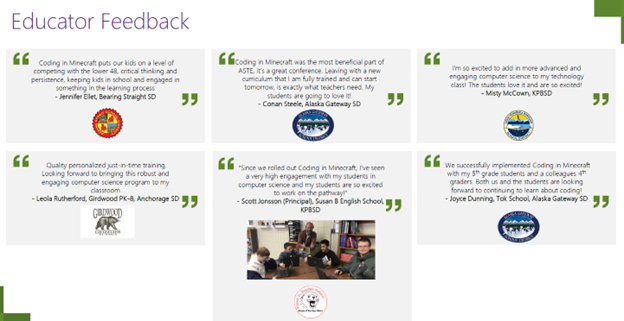- Cama-i, quyana tailuci!
- (Central Yup’ik)
- "Greetings, thank you for coming!"
Computer Science for Every Alaskan Student!
In a world driven by technology, computer science has become a "new basic" skill essential for every Alaskan student. More than just coding, it is a foundational discipline that teaches computational thinking and empowers students to become creators of technology.
This statewide initiative directly supports Alaska’s Education Challenge by increasing career, technical, and culturally relevant education to meet both student and workforce needs. Our goal is to ensure that computer science is a vital and accessible opportunity for EVERY student in Alaska.
Quick Navigation
Alaska Computer Science & AI Education Week
December 8-12, 2025
#CSPowersAI | #CSEdWeek | #HourofAI
Celebrating Computer Science Education Week
In honor of Rear Admiral Grace Hopper (December 9, 1906)
Join Alaska's Statewide Celebration!
Computer science is a foundational science for the digital age, serving as the bedrock for innovation and economic growth. As Artificial Intelligence reshapes every industry, foundational AI literacy has become an essential component of 21st-century education.
This December, Alaska joins the global Computer Science Education Week movement with exclusive live events designed specifically for Alaska students and educators. From hands-on coding activities to conversations with industry leaders, these sessions will inspire students to become creators of technology while learning the principles of responsible and ethical innovation.
All events are FREE and open to Alaska schools and educators!
Alaska Event Schedule
All times shown in Alaska Standard Time (AKST). These events are designed exclusively for Alaska students and educators.
How to Participate
For Alaska Students & Teachers:
- Register for Alaska Events - Sign up for one or more of the live sessions designed specifically for Alaska schools (see schedule above)
- Complete an Hour of Code or Hour of AI - Participate in hands-on coding activities during CS Education Week
- Share Your Experience - Use hashtags #CSPowersAI and #CSEdWeek to share what you're learning
- Explore Additional Resources - Check out the curated activities and lessons below
National CS Education Week Resources
In addition to Alaska's exclusive events, explore these national resources for Computer Science Education Week:
Hour of Code
Access hundreds of one-hour coding tutorials for all ages and experience levels.
Visit Hour of Code →CS Education Week Events
Find global events, activities, and resources celebrating CS education.
Visit CSEdWeek.org →Code.org AI Curriculum
Explore free AI lessons, including the Hour of AI activities for all grade levels.
Explore AI Lessons →Day of AI Resources
Free, open-source AI curriculum developed by MIT RAISE for K-12 education.
Visit Day of AI →Google CS Education Week
Professional development resources, classroom lessons, and teacher stories for CS educators.
Explore Resources →MakeCode CS Education Week
Fun AI activities including Bug Arena, Minecraft First Night, micro:bit CreateAI, and Slither Slam.
Explore Activities →Questions? Contact Anthony White, Alaska's Computer Science Coordinator, at anthony.white@alaska.gov
Introducing Alaska's K-12 AI Strategic Framework
The Alaska Department of Education and Early Development is pleased to introduce the Strategic Framework for Artificial Intelligence in K-12 Education. This comprehensive document was created to provide guidance for school boards, administrators, educators, and students on the responsible and ethical integration of AI tools in the classroom. It is designed as a flexible resource that promotes a balanced, human-centered approach to this transformative technology.
Grounded in seven guiding principles, including a commitment to being Human-Centered, ensuring Fair Access, and promoting Ethical Use, the framework helps districts foster innovation while safeguarding student well-being and data privacy.
Why Study Computer Science?
Studying computer science equips students with a powerful and versatile set of skills for the modern world. It builds a foundation in problem-solving, logic, and creativity that extends far beyond the classroom. Students learn to think critically, navigate the digital landscape responsibly, and transform their ideas into tangible creations, preparing them for success in any future career path.
By prioritizing high-quality computer science education for every K-12 student in Alaska, we ensure that all Alaskan students are prepared to succeed in their education and work, develops worthwhile and satisfying lives, and improve the quality of the world around them.
Understanding the Alaska Computer Science Standards
Alaska's Computer Science Standards provide a comprehensive framework for what students should learn at each grade level. The standards are organized into five core concepts that progress across four grade bands, ensuring students build foundational skills and advance to more complex applications as they grow.
Explore what students learn at each level by selecting a grade band below:
Note: These standards provide a framework for instruction but are not prescriptive about specific programming languages or tools. Educators have flexibility to choose age-appropriate resources and curricula that align with these learning goals and meet the needs of their students and communities.
Key Policies and Milestones
Recognizing computer science as an essential foundational skill for the 21st century, the Alaska Department of Education and Early Development has taken pivotal steps to embed it comprehensively within the state's K-12 education system.
To make computer science a fundamental part of the state education system, we focus on nine policies that are aligned with the Alaska Education Challenge to expand computer science education in K-12 schools.

MARCH 2019
Alaska Adopts First CS K-12 Standards
Establishing foundational computer science education standards for all grade levels.
MARCH 2019
CS Courses Count Toward Graduation Requirements
Commissioner Michael Johnson issued a letter allowing districts to count CS courses (including AP) toward math, science, elective, or CTE requirements for high school graduation.
AUGUST 2022
State CS Coordinator Position Established
The statewide Coding and Computer Science Career Coordinator position was filled at DEED to lead CS education expansion efforts.
JUNE 2023
State Board Adopts Alaska Computer Science State Plan
The Alaska State Board of Education adopted the first Alaska Computer Science State Plan, providing strategic direction for K-12 CS education expansion.
JUNE 2023
CS Teacher Endorsement Pathway Established
Computer Science endorsement and new Praxis required scores for CS certification updated, creating clear pathways for teachers.
Learn More: Alaska Computer Science State Plan Development Process
Computer Science is driving innovation in almost every sector of the US economy. Findings show that over 80% of software engineers are currently working remotely full time, presenting tremendous career opportunities for Alaska students with competitive pay while they continue to live and thrive in their home communities.
Alaska's Education Challenge identified increasing career, technical, and culturally relevant education to meet student and workforce needs as one of its five strategic priorities. Computer Science education in K-12 is an essential part of this strategic priority.
A state plan is invaluable for strategically thinking through complex CS policies and program implementations. A well-designed state plan provides coherence to the overall CS expansion effort, links individual policies with consistent purposes, and ensures an organized approach to all program implementations.
State Plan Development Timeline
DEED initiated the Alaska Computer Science State Plan effort in October 2022 and completed the following milestones:
- December 2022: Completed the initial draft of the plan
- January 2023: Established the CS State Plan Review Committee comprising representatives from school districts, administrators, State CTE program, CS teachers, postsecondary CS and Education programs, indigenous education organizations, CS staff development agencies, and other CS support groups
- January-February 2023: Led the Review Committee's evaluation through three one-hour virtual meetings and incorporated feedback into the revised plan
- February 8-9, 2023: Announced the CS State Plan at the annual Perkins Application Workshop
- February 18, 2023: Presented the plan at the Education Rewired ASTE 2023 Conference with Q&A session
- March 29, 2023: Presented to the State Board CTE Committee and revised to address all feedback
- March 31 - May 1, 2023: Published on Online Public Notice for public comment; revised to address all comments and responded to each individually
- May 5, 2023: Completed the final draft of the CS State Plan
- June 8, 2023: Presented to the Alaska State Board of Education during the Board's regular Quarterly Meeting in Soldotna, Alaska
Result: On June 8, 2023, the Alaska State Board of Education adopted the first Alaska Computer Science State Plan, establishing a comprehensive framework for expanding equitable CS education across the state.
CS Endorsement for Teacher Certification
As of June 2023, computer science teacher in the state of Alaska can add CS endorsement to their teacher certifications through “Content Area Knowledge & Teaching Experience” method. This method requires two years of teaching experience (three years for elementary education) in the content area and passing scores on the endorsement-related content area exam. Only where content area exam(s) have been identified may endorsements be added with this method. For computer science endorsement, the following exams and passing scores are required:
| Praxis Exam II | Test Code | Required Score |
|---|---|---|
| Computer Science | 5651 | 171 |
| Computer Science | 5652 | 149 |
Praxis CS exam 5652 study materials are available. Questions? Contact Anthony White (anthony.white@alaska.gov)
Computer Science Course Codes and Job Assignments
Alaska teachers report the courses they teach using specific job assignment codes. These codes ensure accurate tracking of computer science instruction across the state and help districts plan professional development and resource allocation.
2025-2026 CS Course Assignment Codes
| Assignment Name | Assignment Number | Grade Level |
|---|---|---|
| AP Computer Science | 410 | S |
| Computer Science Special Topics | 213 | B |
Computer Science Special Topics (Code 213)
This assignment code covers specialized computer science areas not included in standard course codes 212 and 178. Use this code when teaching courses focused on emerging and specialized CS topics.
Topics Include:
Cyber Security
Concepts and techniques of defending devices, software, electronic systems, networks, and data from malicious attacks.
Data Science
Concepts of data and data sets. Tools and methods used to extract meaningful and valuable information from collected data.
Robotics
Designing, implementing, and testing robots and robotic systems to perform specific tasks.
Artificial Intelligence (AI)
Concepts of AI and the process by which computers perceive the world using sensors, establish and maintain representations of the world with data collected, and learn from the data.
AP Computer Science (Code 410)
Advanced Placement Computer Science courses prepare students for college-level CS coursework and the opportunity to earn college credit through AP exams.
AP Computer Science Principles (CSP)
An introductory course focused on computational thinking. Students explore how computer software and technology can be used to solve problems. This course does not designate one specific programming language but explores problem-solving using both block-based and text-based programming languages.
AP Computer Science A (CSA)
A programming course taught in Java. Students learn to build server-side applications, games, financial applications, and Android mobile applications. The course focuses on problem-solving, design strategies and methodologies, data structures, and data analysis using algorithms.
Providing Equity in AP Computer Science
Alaska is committed to providing equity in computer science coursework by offering AP Computer Science Principles to all Alaska high school students.
We invite all high school students to take part in AP Computer Science. There are many AP CSP endorsed providers offering their curriculum at no cost to schools and districts with professional development opportunities.
Resources:
Informational Recording (Passcode: 39MN^cd@)
Contact: anthony.white@alaska.gov for more information
CS Professional Development Courses

Alaska Department of Education and Early Development supports Alaska Staff Development Network (ASDN) to bring Computer Science education to Alaska students through Code.org. ASDN is Alaska's Code.org Regional partner and provides professional learning for K-12 educators in Alaska.
Code.org Curriculum Levels
Code.org provides free-forever scaffolded curriculum for K-12 students:
Contact Information:
For information about Code.org opportunities, districts, schools, staff, or students, please contact:
Cheryl Bobo, Alaska Code.org Regional Manager, at cbobo@alaskaacsa.org
Alaska Education Exchange: Comprehensive CS Teaching Resources

Alaska Education Exchange
Alaska Education Exchange is a platform created by the joint support from Alaska Association for Career & Technical Education and Alaska Department of Education and Early Development. The platform provides Alaska education agencies and educators the means to:
- Distribute and manage resources with a robust repository
- Join and Engage diverse communities of practice
- Access, create and share curriculum.
Please register for a free account and join the Information Technology Group to see the latest resources for K-12 Computer Science education.
Computer Science and Technology Resources
Explore our curated collection of free curriculum resources, professional development opportunities, and support organizations to help Alaska educators bring high-quality computer science education to every student.
Elementary Resources (K-5)
Engaging, age-appropriate activities and curriculum to introduce young learners to computational thinking and CS fundamentals.
Featured Resources
CS Fundamentals - Code.org
Grades: K-5 | Type: Full Unit
Well-structured progression of skills with a game-like interface and character themes that students enjoy. Works well for scheduled computer lab time.
Let's Explore AI Together
Grades: K-5 | Type: Activities & Lesson Plans
Age-appropriate introduction to artificial intelligence concepts for elementary students from Columbia Gorge STEM Hub.
ScratchJr Lessons - BootUp
Grades: K-2 | Type: Full Unit
Interactive coding for young learners. Note: Requires app install (iPad) or Chrome Extension on Chromebook.
View More Elementary Resources
Interland: Be Internet Awesome - Google
Grades: K-5 | Type: Interactive Tool
Gamified digital literacy and internet safety education through fun, interactive experiences.
Elementary AI Explorations - aiEDU
Grades: 3-5 | Type: Activities
Hands-on activities introducing fundamental AI concepts to elementary students through engaging explorations.
Computer Science Connections - Code.org
Grades: 3-5 | Type: Full Unit
Integrates CS with math, science, reading, and writing. Helps students make connections between computer science and other disciplines.
Creative Computing Curriculum - Harvard
Grades: K-5 (and beyond) | Type: Full Unit
Comprehensive creative computing curriculum fostering understanding of technology and programming through hands-on projects.
Swift Programming - Apple
Grades: 3-5 (and beyond) | Type: Activities & Full Units
Everyone Can Code curriculum teaches coding fundamentals with Swift. Note: Available for iOS and macOS users only.
Middle School Resources (6-8)
Bridge foundational concepts to more advanced programming and computational thinking for middle school students.
Featured Resources
MIT App Inventor Teaching Modules
Grades: 6-12 | Type: Activities
Students find the immediate feedback motivating. Consider pairing students if device access is limited. Works best when projects connect to student interests or community needs.
Experience CS - Raspberry Pi Foundation
Grades: 3-8 | Type: Lesson Plans
Engaging and interactive lesson plans utilizing Raspberry Pi technology for hands-on CS learning.
Make Arcade Style Games - MakeCode
Grades: 6-12 | Type: Activities & Lessons
Visual programming platform for creating arcade-style games. Encourages creativity and collaboration.
View More Middle School Resources
CS Unplugged - Tech-Free Activities
Grades: K-8 | Type: Activities & Lesson Plans
Teach CS fundamentals without technology through games, puzzles, and interactive experiences. Perfect for limited-tech environments.
CMU CS Academy - Carnegie Mellon
Grades: 6-12 | Type: Full Course (Self-Paced)
Comprehensive, self-paced computer science curriculum for middle and high school students from Carnegie Mellon University.
MIT App Inventor Computational Thinking Curriculum
Grades: 6-8 | Type: Full Unit
Guide students in using MIT App Inventor to develop computational thinking skills while creating mobile applications.
STEMCoding - Ohio State University
Grades: 6-12 | Type: One Class Period Activities
Engaging activities integrating computer science with data science, mathematics, and science concepts.
Creative Computing Curriculum - Harvard
Grades: 6-8 (and beyond) | Type: Full Unit
Comprehensive creative computing curriculum extending to middle school with more advanced projects and concepts.
High School Resources (9-12)
Advanced coursework, AP preparation, and career-focused CS curriculum for high school students.
Featured Resources
CS50 AP - Harvard
Grades: 9-12 | Type: Full Course
Harvard's rigorous introduction to computer science and programming. Engaging, interactive lesson plans for advanced placement students.
AP Computer Science Principles - MakeCode
Grades: 9-12 | Type: Full Unit
Interactive coding environment aligned with AP CS Principles standards. Accessible for beginners and experienced programmers.
Unity Essentials - Game Development
Grades: 6-12 | Type: Self-Paced Course
Comprehensive pathway for learning Unity game development. Helps students gain practical skills in creating interactive experiences.
View More High School Resources
Introduction to Computational Media with p5.js
Grades: 9-12 | Type: Activities & Lessons
JavaScript library that makes coding accessible and engaging, allowing students to create visual and interactive media. Part of NYC DOE CS4All initiative.
Mobile CSP Curriculum - MIT
Grades: 9-12 | Type: AP Course & Full Unit
Comprehensive AP Computer Science Principles course focusing on mobile app development using MIT App Inventor.
P5.js - Curriculum and Resources
Grades: 6-12 | Type: Activities & Full Units
JavaScript library for creating graphics and interactive content. Extensive educational materials for web development and game design.
Explorations in Data Science - youcubed
Grades: 9-12 | Type: Full Unit
Integrates data science and mathematics, providing engaging activities that help students explore real-world data analysis.
Secondary Education Lesson Plans - Unreal Engine
Grades: 6-12 | Type: Full Unit (Self-Paced)
Professional game development curriculum using Unreal Engine. Teaches programming, design, and creativity through game creation.
Game Development - microStudio
Grades: 6-12 | Type: Full Unit
Online game development platform for creating, sharing, and playing games while learning programming fundamentals.
VSCode for Education
Grades: 6-12+ | Type: Development Tool
Professional code editor adapted for education. Supports multiple programming languages with extensions for classroom use.
Artificial Intelligence & Emerging Technology
Prepare students for the future with AI literacy, digital citizenship, and emerging technology resources.
Comprehensive guidance for administrators, educators, and students on AI use in K-12 classrooms
Featured Resources
AI Literacy Lessons - Common Sense Media
Grades: 6-12 | Type: Flexible Lessons (< 30 min or multiple classes)
Introduction to AI concepts and digital literacy. Flexible format for quick lessons or extended exploration.
Curriculum Modules - AI4K12
Grades: 3-8 | Type: Full Unit
Excellent scaffolded approach to AI concepts. Unplugged activities work well for classrooms with limited technology access.
Building AI Knowledge - Quill
Grades: 6-12 | Type: Self-Paced Activities
Interdisciplinary AI activities integrating reading, science, and writing. Features paired aiEDU activities.
View More AI & Emerging Technology Resources
AI 101 for Teachers - Code.org
Audience: Educators | Type: Professional Development
Professional learning course to help teachers understand and teach AI fundamentals.
Interview a Chatbot - Google
Grades: 6-12 | Type: Interactive Tool
Interactive exploration of how chatbots work, helping students understand AI conversational systems through hands-on experimentation.
GenAI Chatbot Prompt Library for Educators
Audience: Educators | Type: Resource Library
Curated collection of effective prompts for using generative AI chatbots in educational settings to enhance teaching and learning.
K-2nd Grade AI Activities - MIT RAISE
Grades: K-2 | Type: Activities (One Class Period)
Age-appropriate AI activities for early elementary students from MIT's Responsible AI for Social Empowerment and Education initiative.
Real-World Career Connections - aiEDU
Grades: 6-12 | Type: Activities
Connect AI concepts to real-world careers and applications, helping students understand practical implications of AI in various industries.
AI Ethics for Middle School - MIT Media Lab
Grades: 6-8 | Type: Curriculum Units
Curriculum addressing ethical considerations in AI development and deployment, fostering critical thinking about technology's social impact.
Professional Development for Educators
Free professional learning opportunities to build your CS teaching skills and earn certifications.
Policy & Professional Organizations
Connect with organizations supporting CS education policy, advocacy, and community building.
Additional Resources & Quick Links
Career Opportunities in Computer Science
Computer science is a critical field in our current and future industry. The Computer Science Jobs Overview document presents a list of the current jobs in the industry. The first part of the list uses the BLS data to identify the different career pathways available in computer science. The second list will focus on the current job market and positions.
View Computer Science Jobs Overview
Not all computer science jobs require college degrees. Many companies will hire students with associate degrees or certifications for many entry-level positions. This list will continue to grow as new specializations and concentrations arise.
Questions related to K-12 Computer Science? Contact anthony.white@alaska.gov



